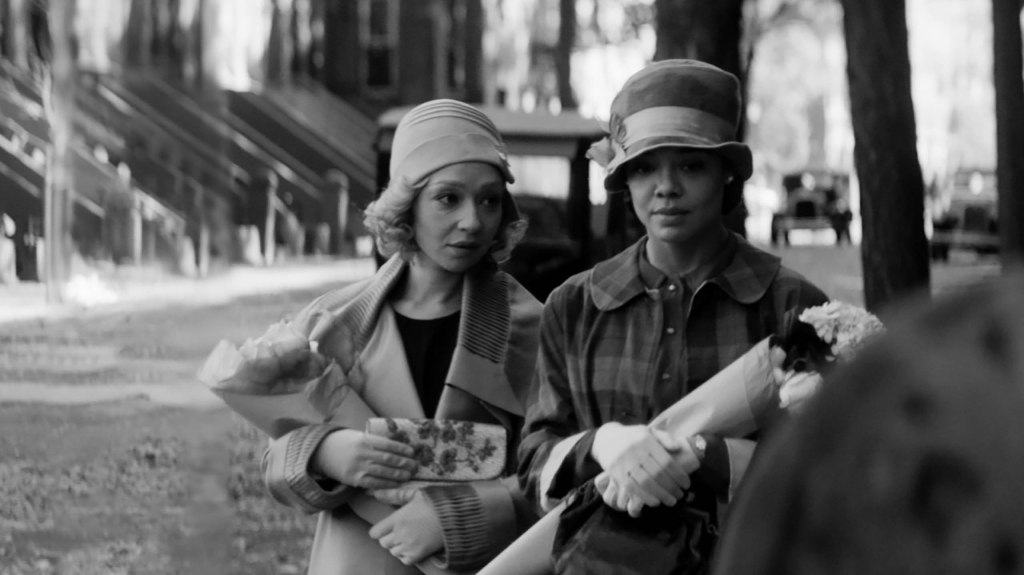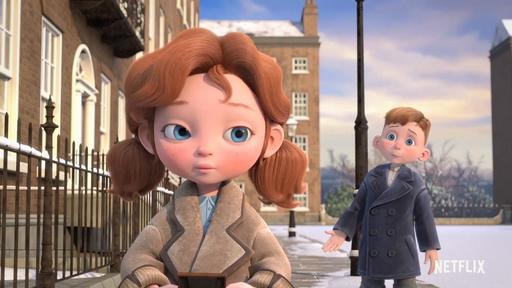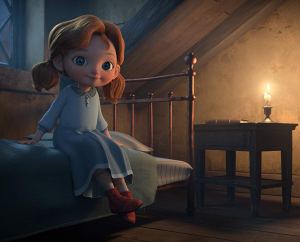This film is based on the electrifying 1920s novel by Nella Larsen depicting two former friends who run into each other randomly in New York City. Irene (Tessa Thompson) and Clare (Ruth Negga) were friends in high school but haven’t seen each other since. Both women are biracial; Irene lives in Harlem with her husband and sons while Clare lives in Chicago with her own husband and child. The major difference being that while Irene lives authentically, Clare is passing for white. Even Clare’s husband John (Alexander Skarsgard) believes her to be white. In fact, needs her to be white, since, as he tells us, the only person who hates Black people more than he does is Clare herself. He’s even given her a “cute” racially-charged nickname that he loves to boast about. Clare lives deep, deep under cover. Irene sees the danger in the situation and resolves to stay away from her, unwilling to keep denying her own race to hide Clare’s.
However, when Clare and John move to New York City themselves, the two women reignite their friendship, despite Irene’s reluctance. Clare has been desperate for the unique comfort of being among her own people, but Irene is terrified of John, and of what might happen should he find out. But a mutual obsession grows the more time Clare spends in Harlem; they seem almost unable to untangle from each other even as their friendship threatens their carefully curated Truths.
Passing isn’t just about race. It takes on gender, sexuality, and importantly, class. Clare’s constructed identity revolves around her passing as white, but Irene’s identity is more wrapped up in her status. As the wife as a doctor, she strictly maintains her middle class boundaries, going as far as to isolate herself in order not to be mistaken for someone of a lower class, while Clare is much more comfortable straddling the lines and treating class as more fluid. Writer-director Rebecca Hall paints a beautiful portrait in which these two women exist, and develop, and she allows Negga and Thompson the space to explore who their characters are and why. Through lenses of happiness, jealousy, security, fear, and desire, we come to know these women and what guides them in their choices.
This is a fertile character study where psychology and motivation are layered in richness and depth. With its deliciously ambiguous ending, Rebecca Hall honours the masterful source material while also creating something impactful of her own.



 Roy McBride (Brad Pitt) has dedicated his life to space exploration. For better or worse, Roy has also spent his life living in his father’s shadow. Roy’s dad, H. Clifford McBride (Tommy Lee Jones), was a legendary astronaut best known for disappearing somewhere near Neptune while searching for extraterrestrial life. Roy never really knew his dad, so when he learns his father may not be as dead as was previously assumed, he’s not exactly jumping for joy. Though to be fair, Roy has clearly never jumped for joy in his life. He’s detached, completely closed off from everyone around him, dedicated only to the missions he’s given, and his next mission is to try to make contact with his long-absent dad, who is now believed to pose a threat to all life on Earth.
Roy McBride (Brad Pitt) has dedicated his life to space exploration. For better or worse, Roy has also spent his life living in his father’s shadow. Roy’s dad, H. Clifford McBride (Tommy Lee Jones), was a legendary astronaut best known for disappearing somewhere near Neptune while searching for extraterrestrial life. Roy never really knew his dad, so when he learns his father may not be as dead as was previously assumed, he’s not exactly jumping for joy. Though to be fair, Roy has clearly never jumped for joy in his life. He’s detached, completely closed off from everyone around him, dedicated only to the missions he’s given, and his next mission is to try to make contact with his long-absent dad, who is now believed to pose a threat to all life on Earth. presumably this is the very same Angela of Angela’s Ashes (McCourt’s mother). If you’re at all familiar with McCourt’s work, then you know it’s got plenty of Irish authenticity, and so does this little film.
presumably this is the very same Angela of Angela’s Ashes (McCourt’s mother). If you’re at all familiar with McCourt’s work, then you know it’s got plenty of Irish authenticity, and so does this little film. The movie’s success lies in what a small, personal story this is. We never feel like the whole south is against them – but it feels worse that it must be one of their neighbours who keeps ratting them out. The police come, guns drawn, to break down their door in the middle of the night in order to catch them in a crime – that of sleeping next to itch other in marital bliss.
The movie’s success lies in what a small, personal story this is. We never feel like the whole south is against them – but it feels worse that it must be one of their neighbours who keeps ratting them out. The police come, guns drawn, to break down their door in the middle of the night in order to catch them in a crime – that of sleeping next to itch other in marital bliss. reserved. There’s not a lot of grandstanding. In fact, he turns his back (and his camera) away from the big, sweeping court scene in order to keep it once again in the heart of the family. Easily eliciting a flood of emotions, it’s actually a relief to see them played out so superbly on Negga’s face, and in Edgerton’s shoulders, rather than some melodramatic speech. The restraint here is a credit to Nichols’ directing, but also to this wonderful casting.
reserved. There’s not a lot of grandstanding. In fact, he turns his back (and his camera) away from the big, sweeping court scene in order to keep it once again in the heart of the family. Easily eliciting a flood of emotions, it’s actually a relief to see them played out so superbly on Negga’s face, and in Edgerton’s shoulders, rather than some melodramatic speech. The restraint here is a credit to Nichols’ directing, but also to this wonderful casting.